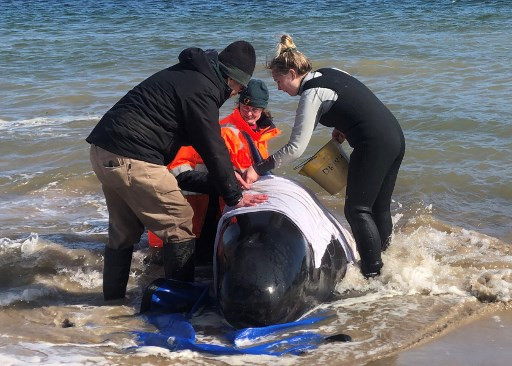Popular Reads
Top Results
Can't find what you're looking for?
View all search resultsPopular Reads
Top Results
Can't find what you're looking for?
View all search resultsRescue of stranded whales in Australia enters final days
Change text size
Gift Premium Articles
to Anyone
 A handout photo taken on Tuesday and received on Wednesday Tasmania Police shows people helping a whale in Macquarie Harbor on the rugged west coast of Tasmania, as hundreds of pilot whales have died in a mass stranding in southern Australia despite efforts to save them, with rescuers racing to free a few dozen survivors. (Handout/Tasmania Police/AFP/-)
A handout photo taken on Tuesday and received on Wednesday Tasmania Police shows people helping a whale in Macquarie Harbor on the rugged west coast of Tasmania, as hundreds of pilot whales have died in a mass stranding in southern Australia despite efforts to save them, with rescuers racing to free a few dozen survivors. (Handout/Tasmania Police/AFP/-)
R
escuers were trying to save the few remaining long-finned pilot whales still floundering in shallow waters off the Australian coast on Friday in one of the world's biggest mass whale strandings.
With time running out for up to 20 breathing mammals still trapped in rugged Macquarie Harbor in Tasmania, rescuers had managed to save about 94 of the 470-strong pod while around 380 had died.
Read also: Australia plans disposal of hundreds of stranded whale carcasses
"We haven't dealt with a stranding of this type before (and) we are getting up to 94 animals released - that is one hell of an effort," said Kris Carlyon, a marine conservation biologist advising the government's response.
Most of the released whales, a gregarious species that lives in deep waters, were expected to "regroup" and recover from the traumatic event, Carlyon said, but a number of them had returned to the sandbar and died.
The rescue attempt, which has involved a team of more than 100 rescuers, volunteers and police, would continue through Friday and Saturday to try to save the last few animals, officials said.
Authorities were also attempting to contain the carcasses of the dead whales, at least one of which had been found mauled by predators. The bodies were being separated into groups and enclosed with water booms to try keep them in one place, as officials prepare to dispose them at sea.
"We've certainly had one carcass that's been chomped and another report of sharks further up the coast," said Nic Deka, the incident controller for the state government's Parks and Wildlife Service.
"There are sharks around, their numbers may increase with the carcasses in the sea but we are doing a few things to try and get them to decompose and break down more quickly so that if that is an issue it's an issue for less time."
The stranding, the biggest on record in modern Australia and one of the largest in the world, has drawn attention to a natural phenomenon that remains largely a mystery to scientists.









